Stephen Roney's Blog, page 249
March 20, 2020
Journal of the Plague Year

Did my grocery shopping today. I have enough supplies laid by for a couple of weeks of quarantine, but I do not want to use that now in case I need it later.
There was a short lineup at the entrance; a security guard was letting in only five at a time. Social distancing. But the wait time was not long.
A sign on the window warned that they were out of toilet paper, an advertised special. More coming, it promised, in 48 hours.
Customer carts and reusable shopping bags were not allowed in. Reasonable; but I had to leave my cart and bag outside, which was worrisome.
The meat counter was stripped bare. But it was restocked before I had finished shopping. Eggs were out; but restocking began while I was there, and the clerk handed me a carton. Lots of bread; a selection of cheese. The one item I wanted and could not get was powdered milk. There were a few other bare shelves among the non-perishables.
On the way there and back, I passed three city buses, running as usual. Each had only one passenger.
When I arrived home, there was an email from Walmart seeking employees, probably to stock shelves. The grocery outlets at least are doing a good business.
As I wrote that paragraph, there was a sudden downpour outside my window. Doubly odd—I have just come back in, and I had not noticed a cloud in the sky. And this is the first rain of the year. It is still winter for one more day, by the calendar.
And as I type this, it is suddenly again bright and intensely sunny outside my window.
I want to see it as a sign.
I now know how to spell chloraquine. I have been hearing or reading about it for months; first about its use in Thailand. There has more recently been a peer-reviewed French study, with a control group, that found it 100% effective against coronavirus with a sample of a few dozen patients.
This is a drug we already have in circulation; we have been using it since the 1930s. Since we have used it for decades, we know it is safe. Since it is already in production, we can get it out quickly. If we can get it out quickly, might the need for lockdown and quarantine be over in weeks?
It almost looks like a miracle.
Trump just held a press conference, and the reporters were asking about it. His surgeon-general, Dr. Fauci, was talking down the possibilities, calling the claims “anecdotal,” insisting that we need more trials, while Trump was almost openly disagreeing with him, saying “What have we got to lose?”
This might have been a deliberate good cop-bad cop act, at least on Trump’s part, getting public pressure to build and force the government’s hand, while the government could avoid blame if it did not work out. Everyone with a sick relative is going to be on Trump’s side in this little debate.
Meantime, Belgium and Poland are apparently already using it as standard treatment. We should soon all see for ourselves how that goes.
Even if the Americans really do need to do more tests, why need such tests take any longer than the usual course of the ailment. They should not lack for test subjects; they can run tests concurrently. If, say, the virus usually lasts two weeks, and clears up in three or four days with the pills, we should have test results in a couple of weeks.
Trump scolded the press at his conference for sensationalizing and making things look worse than they are. I think that is right; it is the natural tendency. Bad news makes the better story. I think things may be far better than they look at the moment.
I think we may be looking much better in about two weeks.
'Od's Blog: Catholic and Clear Grit comments on the passing parade.
Published on March 20, 2020 11:09
March 19, 2020
Waiting for Godot
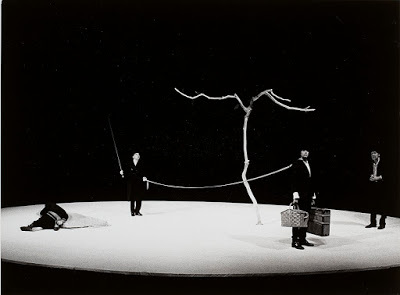
We imagine ourselves as Vladimir or Estragon, wandering aimlessly through our modern-postmodern wasteland wondering why Godot has not yet come.
It is a damnable lie.
Godot—God—has no reason to hide from us. Remember the story of the Garden of Eden. It was Adam and Eve who hid from him.
We are only conning ourselves that we are looking for him. If he were to appear, we would crucify Him.
The wasteland is our protective shell of lies, that keeps us from having to think. Then we can go about our daily lives untroubled, worrying only about in which ditch to sleep. It is the matrix; it is the idolatry we have inherited from our parents.
We find any sincere quest for truth profoundly threatening. Leave aside Jesus; Socrates was executed for asking too many questions.
We would rather believe the obvious nonsense of Marxism, long ago disproven; or of Freudianism, long ago disproven; of postmodernism, or existentialism, or for that matter of “Hallelujah Chorus” Christianity, which obviously contradicts the gospel, but looks easier. There are many such idols of the tribe. The one thing they have in common is a denial of moral concerns.
Here’s the plain truth. God is both omnipotent and benevolent. He will hide nothing. All it takes is a sincere quest for the truth, and truth begins to be apparent. “Seek and ye shall find.”
This is why Descartes was able to conclude that anything we perceive with clarity and distinctness must be true.
Of course God would not have abandoned us in some wasteland without direction.
Here’s how simple it is: the point of life is to seek truth, and the good, and beauty. As soon as you seek truth, you have found it, because the sincere effort to find truth is the essential truth of life. As soon as you seek good, you have found it, for the sincere effort to be good is the essential good. As soon as you seek beauty, you have found it, for the quest for beauty is the most beautiful of stories.
As Vladimir might well have mumbled to Estragon, “Now where did I put my nose? I’m sure I left it around here someplace…”
'Od's Blog: Catholic and Clear Grit comments on the passing parade.
Published on March 19, 2020 07:26
March 18, 2020
Addendum
Reassuringly, the local supermarket flyer came out today as usual.
And, cheekily, their front page claimed a special price on toilet paper. Canada should run out of toilet paper about when Newcastle runs out of coal. Also a special on dried beans.
Definitely doing their bit to tamp down anxiety. Galen Weston has promised not to raise prices during the pandemic.
'Od's Blog: Catholic and Clear Grit comments on the passing parade.
Published on March 18, 2020 10:35
Journal of the Plague Year
 © 2012 Kassy. Licensed under CC-BY.
© 2012 Kassy. Licensed under CC-BY.While the economic consequences of the coronavirus look grim, I did a little surfing online, and it is not clear the last worst plague, the Spanish Flu, or other epidemics since, did much lasting damage. It is hard to separate its effects from those of the First World War; but had they been that dramatic, surely it would not have been so hard.
Apparently, the clearest effect is that, like the Black Death, it caused labour shortages and drove up the price of labour. Which is not a bad thing for the poor, if not perhaps the economy as a whole. And it prompted an extension of the social safety net. If the economic fundamentals are sound, there is no reason why such a virus should be more than a temporary hit, so that everything can come back once it’s over.
The question is, are the fundamentals sound?
It seems to me that the experience is going to cause some long-term changes—a systematic effort to “decouple” from China and bring supply chains for critical supplies home to North America and Europe. Quite possibly a strong boost for technological changes that were making sense anyway: online education, working from home, a general exodus from the big cities, robotics, online conferencing. Maybe a boost for the concept of a Guaranteed Minimum Income.
I’d worry about the housing and mortgage market; I’d worry about the viability of the universities.
An article in Quillette makes the same argument I was making: that the virus is stress-testing different societies, and Europe and Iran (and perhaps North America—we’ll see) are revealing themselves to be decadent in comparison to East Asia, Eastern Europe, Israel, and Jordan.
“In an interview published yesterday, the director of a hospital in Madrid was unusually forthcoming. Still traumatized by the images of the emergency care unit where he works, Santiago Moreno confessed that ‘we have sinned from too much confidence.’”
That maybe sums it up.
“A week ago, the Spanish government actively encouraged all Spaniards to go to the streets and join dozens of very large marches for gender equality. When asked about the infection hazard, one minister publicly laughed.”
One town in France, she reports, in response to early signs of infection, organized a Smurf convention to lighten spirits.
“At the time of the Madrid marches and the Smurf convention, I was returning from a long journey in Asia and could not help noticing the contrast. In India, or Singapore, or Vietnam, people were dramatically changing their behaviour to adapt to the coronavirus. They were going out less, avoiding large groups, taking turns on the elevator and, of course, wearing masks everywhere, even if perhaps they looked less elegant in them.”
And she concludes: “it carries a dark foreboding for the future of a continent which seems to be poorly prepared for a world beyond normal times.”
We may hear less in future of the immense agonies and injustices supposedly borne by this or that special interest group. Just as an immune system, lacking enough to fight, will sometimes turn on its host, if we lack enough real problems, we start inventing them.
'Od's Blog: Catholic and Clear Grit comments on the passing parade.
Published on March 18, 2020 08:02
Gerry's Shrine
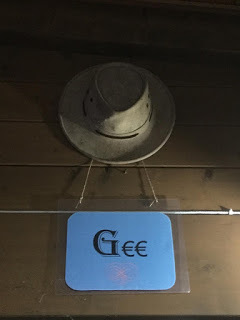
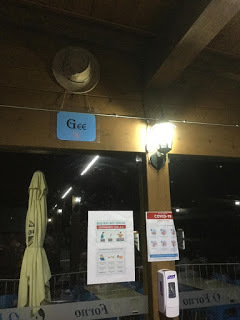
At the pub in Portugal where he used to perform, they've put up a little shrine to my recently-deceased brother, Gerry.
It makes me think of Rupert Brooke's war poem, "The Soldier."
If I should die, think only this of me:"England" should be "Canada," in this case, but that does not scan.
That there’s some corner of a foreign field
That is for ever England. There shall be
In that rich earth a richer dust concealed;
A dust whom England bore, shaped, made aware,
Gave, once, her flowers to love, her ways to roam;
A body of England’s, breathing English air,
Washed by the rivers, blest by suns of home.
And think, this heart, all evil shed away,
A pulse in the eternal mind, no less
Gives somewhere back the thoughts by England given;
Her sights and sounds; dreams happy as her day;
And laughter, learnt of friends; and gentleness,
In hearts at peace, under an English heaven.
It is a time for death, it seems.
'Od's Blog: Catholic and Clear Grit comments on the passing parade.
Published on March 18, 2020 07:24
March 17, 2020
The Upside of the Coronavirus
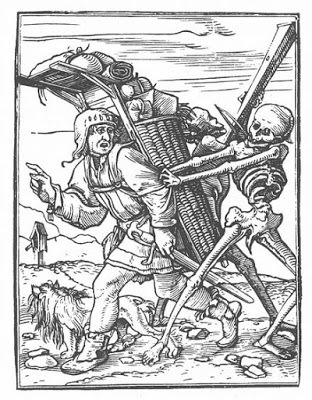 Hans HolbeinThis afternoon I did my first ever over-the-phone doctor’s appointment. It was a bit confused; it was obviously almost her first too. I got a clean bit of health, and she assured me I was not high risk for the coronavirus.And she said “Bless you” before we signed off.
Hans HolbeinThis afternoon I did my first ever over-the-phone doctor’s appointment. It was a bit confused; it was obviously almost her first too. I got a clean bit of health, and she assured me I was not high risk for the coronavirus.And she said “Bless you” before we signed off.We may see here the great benefit of this plague; and it may explain why God sent it.
For as I have noted, there is no dodge by which, if God exists at all, we can pretend He does not will such things.
Last week, it would have been unacceptable in Canada for a professional to say “bless you” to a client, neither knowing the other’s religious beliefs.
I saw this morning the shop clerks busily restocking shelves at the supermarket, and I felt an upwelling of love for them, thinking of them as real heroes.
In other words, we have here clear evidence that this thing is bringing us closer to God.
It is the very same reason for which He sent plagues in the Old Testament.
It is sadly human nature that, so long as things are going well, we stop appreciating it, grow selfish and ungrateful, and stop thinking about God or Right or Truth or our fellow man or much else.
It seems to me it may well be that, as a result of this plague, we may start pulling back from the culture of self and death and moral relativism into which we have been tailspinning. Or at least more of us may.
'Od's Blog: Catholic and Clear Grit comments on the passing parade.
Published on March 17, 2020 12:29
Addendum
Out for a morning walk for exercise, dropped in to the local grocery out of a sense of reportorial duty.
Happy to report that the bread shelves and eggs shelves are already fully resupplied, and store staff were putting the last sealed meat packages in to restock the meat shelves.
It looks as though our supply chain for basic food stuffs is still pretty solid.
The store was doing brisk business; people are still stocking up.
Saw a city bus go by--with only one passenger.
Local restaurants are, of course, closed, with signs on the window: take-out only.
'Od's Blog: Catholic and Clear Grit comments on the passing parade.
Published on March 17, 2020 08:34
A Journal of the Plague Year
Have been trying to send money to my family in the Philippines through PayPal. Had weird problems: not able to access my PayPal account despite repeated calls to their help centre. Tried again this morning.
Got a recorded message.
Their help centre is closed due to coronavirus.
First sign of financial systems shutting down?
A few minutes ago, the Premier of Ontario, Doug Ford, looking almost tearful, announced a ban on all gatherings of more than 50 people. All religious services, all schools public and private, all theatres and cinemas, all libraries. Effective immediately.
Today the local clinic phoned—the clinic that was unexpectedly closed yesterday. The receptionist told me NOT to come to the clinic, that all business would be handled over the phone.
Canada shut its borders yesterday. France announced a lockdown.
Things feel surreal; as though I wake up to a dream. It is still only 9:30 in the morning.
Over the last few days, we have heard several government sources talking about things going on this way until August or September.
'Od's Blog: Catholic and Clear Grit comments on the passing parade.
Published on March 17, 2020 06:44
March 16, 2020
A Journal of the Plague Year
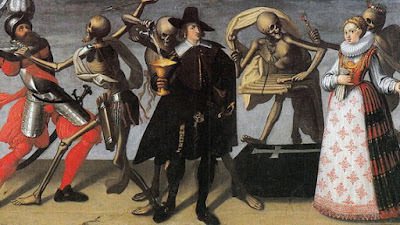
It seems we are living through a historic time.
It occurs to me therefore to give a daily on the ground account of how it is all affecting this mortal in this little corner of Toronto’s east end. Some day it may be of some historical interest.
Went up to the corner this morning to pick up some Vitamin D. I had seen on a YouTube video (I think it was Dr. John Campbell) that it has been shown to protect against respiratory diseases generally. I had been told in the past that I had a deficiency; so now seemed the time to take that seriously.
Thought at the same time I’d pick up a few things at the grocery store.
I found the local clinic was closed today—notice on the door. No reason was given.
Then at the grocery store, the first signs I had yet seen of real public concern. I had been there for my regular shopping on Thursday morning, and then there were no signs of anything unusual. This morning, the meat section was mostly stripped clean, the bread racks bare, the egg section empty, the selection of cheese slim. I could not pick up powdered skim milk; they were cleaned out. I could not get my preferred brand of tea. I saw no toilet paper on sale; but people were wheeling out big packages of paper towels. The shop still had lots of sanitizing hand soap.
News of things shutting down is coming in hourly. It is hard to keep track.
'Od's Blog: Catholic and Clear Grit comments on the passing parade.
Published on March 16, 2020 11:48
Jesus Met the Woman at the Well: Take 2
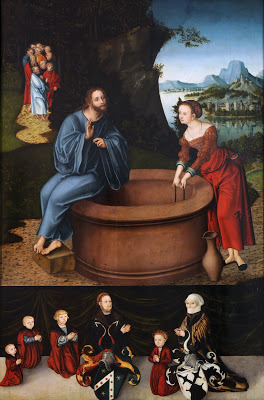
“Are you greater than our father Jacob, who gave us the well and drank from it himself, as did his children and his livestock?”
The story of the Samaritan woman at the well, last Sunday’s reading, looks like another parable of the need to overcome the natural idolatry of parents or ancestors. This is especially true if we come from a dysfunctional family; it is always true in any case.
For two wells, two waters, and two authorities, are contrasted: the physical well, and the spiritual well of the Logos; the physical water and the spiritual, or “living,” water of the Gospel; Jesus and ancestral custom, personified as Jacob, the eponymous ancestor of Israel.
And the answer is obvious: Jesus is the higher authority.
“So the woman left her water pot, went away into the city.”
She discarded the water of her ancestors. This is an either-or choice. “He who does not despise his father for my sake is not worthy of me.” “Family values” are not a part of Christianity, but radically apart from Christianity.
The point is signed and underlined by her being a Samaritan. The Samaritans and the Jews had irreconcilable differences regarding the proper place of temple worship; as the story reminds us. Both cannot be right. And Jesus unambiguously tells her her ancestors were wrong.
“You worship that which you don’t know. We worship that which we know; for salvation is from the Jews.”
So she faces the eternal human dilemma: accept the unconsidered assumptions inherited from your father, who at best was no more than a man, or fight through for truth.
It is here perhaps that it becomes significant that she is apparently an outcast in her own community: coming at the unseasonable hour to get her daily water, to avoid encountering others. It is naturally enough those kicked to the bottom of the social totem pole who will find it easiest to see the shared delusions. They obviously have less to lose. See the Beatitudes on this. Children are also more apt to see, having not yet been so thoroughly indoctrinated. “For such is the Kingdom of God.”
I had noted previously that the woman must have been socially rejected because she was living in adultery. I was wrong. By the rules of ancient Israel, concubinage was respectable; consider Abraham’s concubine Hagar, the mother of Ishmael.
She was more likely to have been rejected for having five husbands. A surprising fact; so surprising that it proves Jesus was not just using intuition or playing probabilities, but had true supernatural knowledge. There are two possibilities: either the husbands divorced her, socially branding as a terrible wife; or they died, suggesting she was a jinx. Or a poisoner. Either would explain her social isolation. And either would amount to a profound experience of rejection.
I think we can also infer that she must necessarily also have been extremely attractive and/or accomplished, to have had five or six suitors despite this.
When the woman asks Jesus for the living water, why does he respond, “go, call your husband?” Why need her husband be involved?
Precisely because this is a social problem, a sin of the fathers visited upon the fourth generation. It would not be enough for her to see the truth, so long as she is committed, through marriage, to that corrupted social order. Unless she is, like Peter, to abandon spouse and family, they too must be brought along.
The woman responds that she has no husband. Jesus agrees that this is true, and reveals that he knows her entire marital history.
But if he knows her entire marital history, and knows this to be true, why did he tell her to bring her husband?
The point is that she both has and does not have a husband, depending on how you look at it, surely. The reference might be to concubinage, in which case Jesus might be accused of having spoken with less than perfect accuracy on the first occasion. This is not a plausible inference, however, since he is omniscient, and immediately demonstrates this. It seems more likely that the woman actually did have a husband, and was lying.
Why would she lie?
Oh gentle reader, you are innocent in the ways of romance. This woman has just met a handsome stranger at a well. Meeting at a well is the usual first act of a Biblical romance—Jacob himself, whose well this is, met his wife at it. This appears to be a woman with a reputation for playing the field, as it were, and who is apparently naturally highly attractive. Admitting she is married might kill the fun.
If so, she actually has had six husbands, counting the present one, and Jesus would amount to the projected seventh—a magical number for the Bible.
So when Jesus says her present husband is not really her husband, he is making a more general point, about family ties.
We all both do and do not have earthly fathers; for our true father, Jesus reminds us elsewhere, is always and only our father who is in heaven. We all both do and do not have husbands; for our true husband is always Jesus, the Seventh, the Sabbath spouse. Earthly spouses are, in the end, transitory and arbitrary, like well water. Any five or six might do.
We must not elevate family ties to divine status; and this is the usual temptation.
“So when the Samaritans came to him, they begged him to stay with them. He stayed there two days. Many more believed because of his word. They said to the woman, ‘Now we believe, not because of your speaking; for we have heard for ourselves, and know that this is indeed the Christ, the Savior of the world.’”
This fulfills Jesus’s requirement that the Samaritan woman bring her husband. She brought the entire community, and they had to be converted as a group.
'Od's Blog: Catholic and Clear Grit comments on the passing parade.
Published on March 16, 2020 11:32



